My MonSec Experience
Table of Contents
As I conclude my time at the Monash Cyber Security Club (MonSec) committee, I’ve written this summary of my journey with this incredible club.
The Beginning #
My first year in university wasn’t normal, due to the COVID-19 pandemic I had to adjust to both learning from home and to socialising in a complexly new environment with more restrictive means of interactions. The following year’s orientation week, I noticed some familiar names on the cohort’s Discord server mentioning they will be representing the cyber-security club at the student association’s orientation festival. Since I didn’t know anybody else that went to that event, I decided to check their booth out. The first 2 people I met from MonSec were Leo and Luca, who were super-friendly, they asked me of my previous experience and presented me with nifty lock-picking and cryptography challenges. The most memorable part was when Leo asked me of my previous experience, and I jokingly said “I use Arch by the way” (note to self: that joke went horribly in retrospective).
Assistant Member Training Officer #
It turns out that there were some available positions in the MonSec committee at the beginning of 2021, I was pondering if I should try applying. I asked Leo about it during a Java class we both attended, and he said that I should go for it. In the application form, I wrote a short summary about myself, with a link to my GitHub, in order to showcase my previous experience as evidence to my work ethic. That seemed to make the difference, because after a few weeks, the committee announced that I got accepted, and I asked them why it turns out I was of a few people that included external hyperlinks as evidence to my projects.
During this period of a semester and a bit, I learned about how MonSec works from behind the scenes, ran an online workshop whose demo didn’t go as planned (immensely valuable for troubleshooting future workshops). The conversation I remember the most from this period was my introduction to the then-secretary, Luke who told that the MonSec team culture is based on recognising that the MonSec committee members are students, thus being relatively relaxed with deadlines is a requirement. At the time, I didn’t understand how critical it was that we made that part of the team culture official from the start of each term, but it made my presidency much more enjoyable.
Secretary #
The following year I moved to a more paperwork-heavy and administrative role, that involved record keeping of the committee and general meetings. I found it hard to parallelise the functions of documenting the meeting, and being attentive to what is being said. This struggle lead me to use several methods of documentation, such as a multi-media recording of the meeting, thus diversifying the dependency from one source of truth to multiple. In addition, I saw an opportunity to automate some repetitive routines, mainly the generation of plots for the semi-annual general meeting reports. I wrote a Python script that ingests the membership log of the club, and produces a set of plots for future secretaries to use in their report.
During this semester I ran my first workshop for the year on reverse-engineering, sadly from home due to a COVID-19-positive test result.
Vice-President #
Towards the end of 2022’s first semester, the then-president Peter notified the committee of his intention to resign during the Ordinary General Meeting (OGM). As expected from a relatively-niche club of the size we where at the time, it wasn’t a guarantee that we could fill the vacancy by having someone new (to the committee) putting their name on the ballot for such a senior role. In order to keep MonSec running, we had to step up and be ready to accept a role with more responsibility, and teach what we learned to the person that replaces us in the previous role. After more than a year later, it’s safe to say that the MonSec team showed their versatility as most of the committee had to learn and perform a new role at the same time with far less preparation time. It should also be noted that this versatility positively impacted the committee transition to 2023.
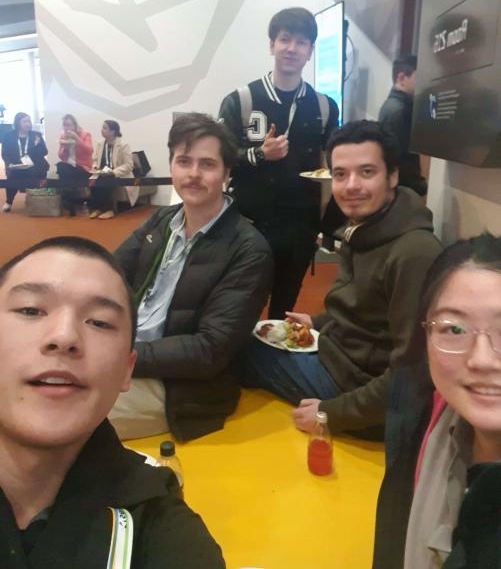
This role was an amazing preparation to the next year, as I got to talk to academic and industry stakeholders such as researchers, university staff, sponsors and partners and plan future engagements with them.
During this semester, I ran a beginner-level workshop about steganography, the art of hiding information in plain sight within other pieces of information. In addition, Akbar and myself began working on the Kali Linux set-up guide1 around this time, as we saw commonalities in the troubleshooting methodologies we employed to help our members get their virtual machine running running.
President #
Before Peter’s role ended, he handled the paperwork required to register MonSec as a non-profit organisation, which he intended to be used for discounted digital infrastructure. Initially, we intended to focus on transitioning our CTFd server to Microsoft Azure, since they offer a non-profit grant that will be substantially cheaper for us. Our systems administrator Matti, did a tremendous work learning Infrastructure as Code (IaC) in order to have our Azure resources documented. His work enabled the next system administrator, Kar Jun to up-skill himself, and it also gave me an excuse to learn Terraform as well.
With the 2023 committee assembled, I had some plans to make the club’s mission reach more people through improved social media.
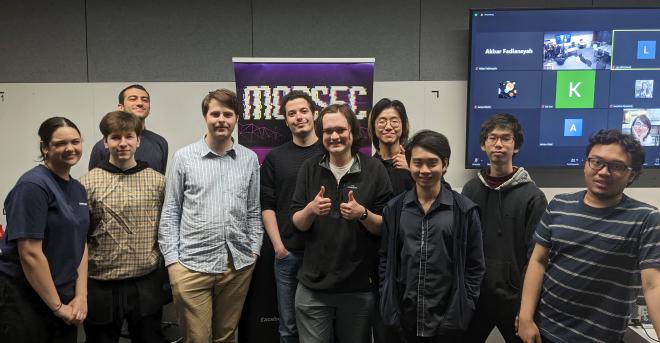
Preparation #
We started by planning the events we will have during semester 1, which included our weekly workshops and the promotional activities during the orientation festival. Since I haven’t worked extensively with most of the team beforehand, I got to know them and their goals for the club and their roles throughout the summer break. I wanted to be sure that all of the team members understand their part in the club’s mission and the time commitment the team members can expect from each other. I felt this was important to define since the team is composed of university students, thus making it unrealistic to expect the same level of commitment of everyone regardless of their individual circumstances.
2023 Semester 1 #
We started the semester 12 at the orientation stall, where the team introduced MonSec to new students, with goal of getting Monash University students to attend our weekly workshops.
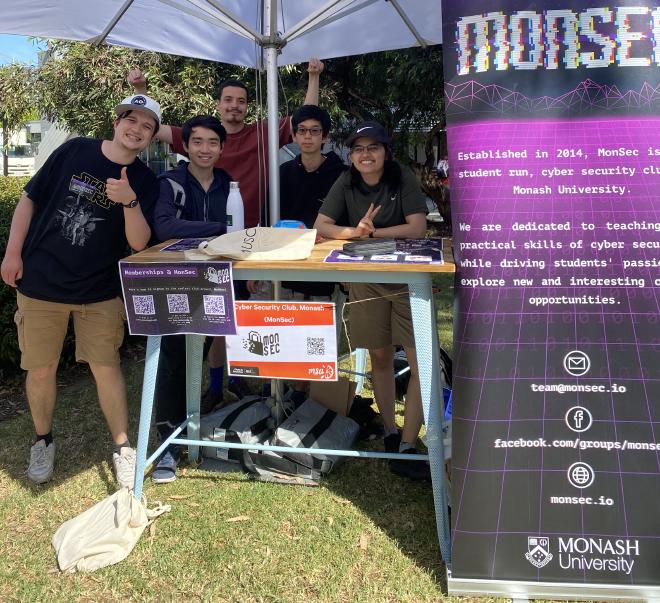
We used the classic analogy of lock-picking to explain the philosophy of hacking to new MonSec members. This method has been demonstrated in every orientation festival to be very effective in attracting curious students to attend our events.
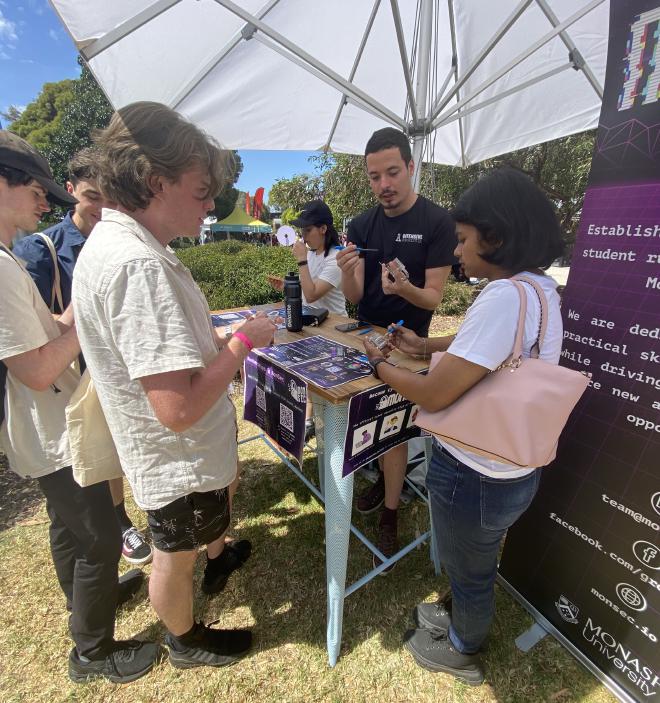
We featured a several guest speakers that showcased our shared passion for cyber-security and the curiosity that it entails.
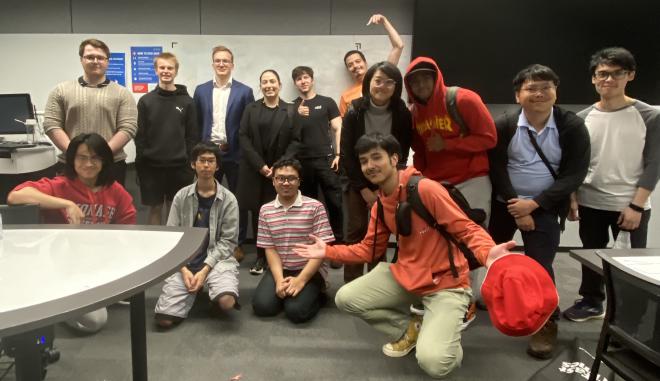
Due to Elias graduating in semester 1, we had to elect a new vice-president, and to fill a vacant sponsorship officer position. We enthusiastically welcomed Sarah as VP and Oscar as sponsorship officer.
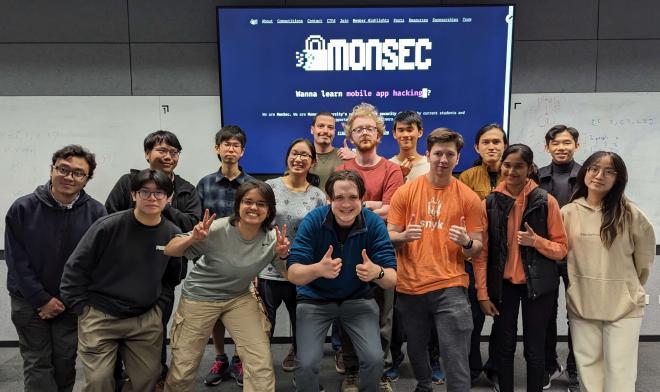
During this semester I ran a beginner-level workshop about one of my favourite topics, the Linux command-line interface and how to use it’s user permission system.
Beginner CTF #
We held our annual beginner-friendly Capture The Flag event, this time with support from EY that provided the catering and some of their talented consultants. With their help, the CTF participants had a better understanding of the challenges and of the cyber-security industry.
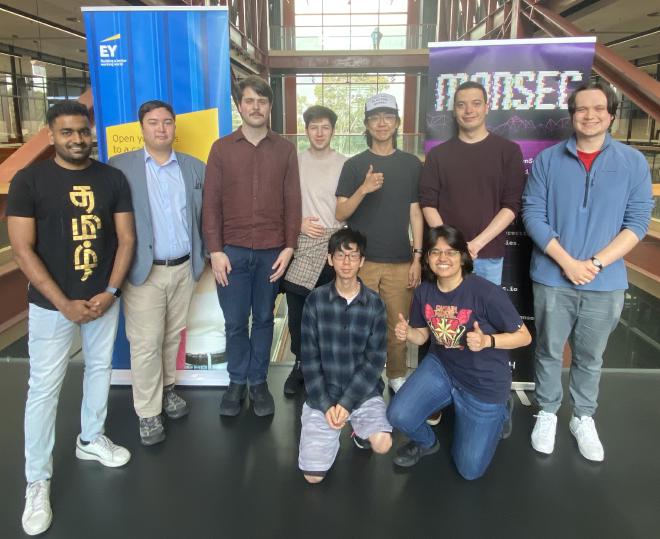
2023 Semester 2 #
We started semester 23 by planning the progression of weekly events, which (like all good plans) we had to modify several times throughout the semester. We also took part in a smaller orientation festival, which surprisingly yielded more members. In addition, we also worked on a new sponsorship prospectus and a slightly-revised website, both to serve as a long-term framework for further enhancements in our online presence.
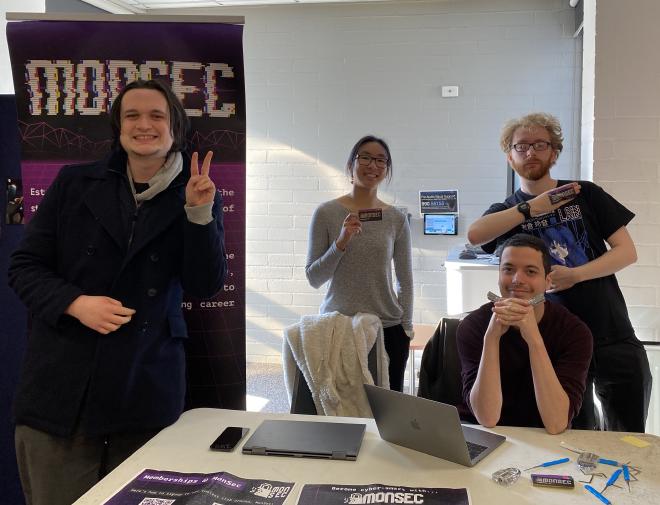
During this semester I ran 2 workshops about reverse-engineering (2nd iteration) and about reverse shells.
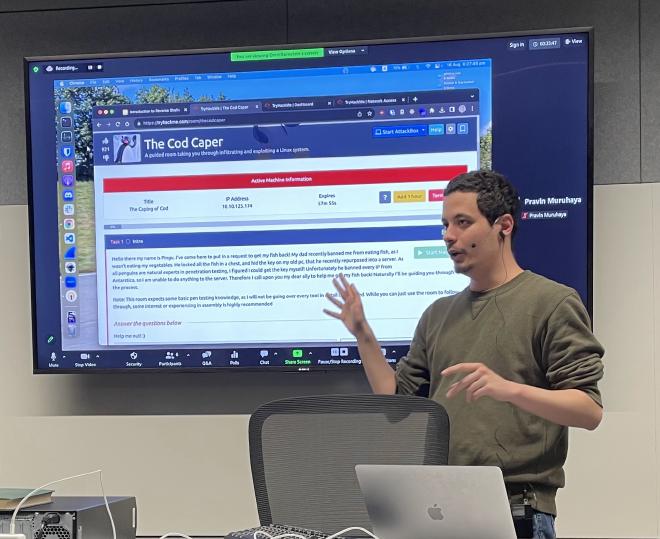
We also had a couple of workshops that are a bit different then what we usually have been doing. We partnered with Nick from The Legal Forecast to run a workshop/discussion with our members about the various legal frameworks that seek to guard our privacy.
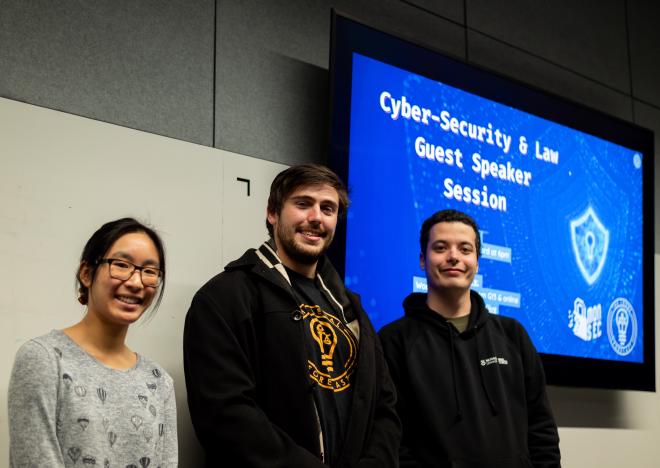
Overall, I’m very happy with the impact I had on MonSec throughout the last year, especially with how we work with each other and other organisations.
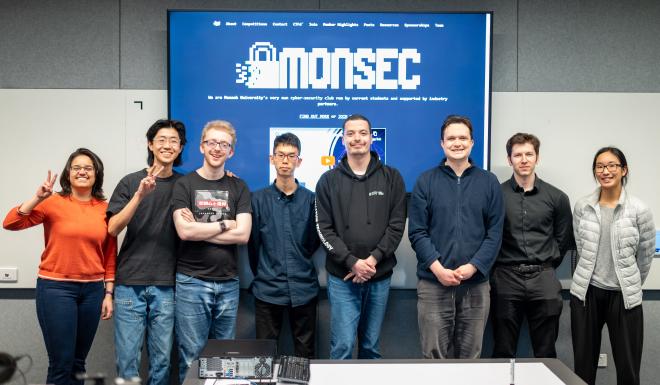
The Future #
The committee is in the the midst of the handover period, and I’m beyond impressed by their dedication. Planning for next year’s events is underway, and I’m sure next year’s MonSec members will be pleased with the breadth of workshop concepts and guest speaker sessions that will be featured.
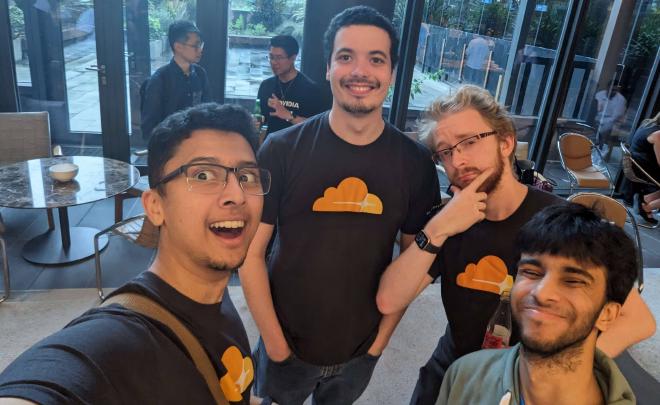
I should emphasise that Rohan, Oscar and myself aren’t officially related to Cloudflare, as we just think their shirt looks cool.
Credits #
This journey was not possible without my teammates and friends that made this experience one of the highlights of my degree.
- Leo has been instrumental in shaping how MonSec runs its technical workshops, which is evident by the unique taste and style of the educational content he produced.
- Peter was immensely helpful in registering MonSec as a not-for-profit organisation, along with providing the committee with meaningful guidance.
- Emily, Luke, James, Luca and Marcus were crucial in showing how to be a productive team member in a stressful time such as in during the COVID-19 pandemic.
- Akbar has been instrumental in maintaining our media pipeline and our website, along with being a diligent secretary.
- Matti was the cornerstone of MonSec’s cloud migration effort, which is safe to say he nailed. In addition he taught me a lot regarding server administration throughout his time with MonSec.
- Yuki has been a joy to work with, especially due to his passion for cyber-security and due to his ability to go above and beyond with organising the club’s files and workflows, running and helping with technical workshops and being a go-to person for many of our members.
- Sean was essential for maintaining the club’s financial records during my presidency, which he did flawlessly even throughout his industry internship.
- Jamie has transformed the club’s media pipeline with Canva, which enabled a more diverse design capability and tighter collaboration, while maintaining a vibrant social media presence for the club.
- Elias has been an amazing friend and vice-president, and because of his persistance we managed to secure a sponsor for the Beginner CTF. Moreover, he also went above and beyond to run a weekly CTF-like walkthrough on the club’s Discord server.
- Kar Jun maintained the clubs cloud infrastructure for the CTFd server we use in our events, which was executed perfectly while learning our management practices and troubleshooting in real-time.
- Preeti has been vital for the club’s engagement with members, as she’s been helping to troubleshoot and clarify issues during our workshops.
- Sarah has been expanding the club’s relations with the industry, the university and the greater community, which will be utilised next year. In addition she has also been editing the workshop recordings and helping with the social media publications, preparing and running several workshops, and helping the members to troubleshoot.
- Oscar has been essential in the recent engagements with industry stakeholders such as sponsors and partners, and I reckon the outcome of his current work will become visible soon. He also professionally captured the photos of our events throughout 2023.
- Rahul and Chloe helped my team with designing high-quality posters for our weekly workshops’ social media publications. The distinct quality of their work can be easily observed when compared to our other publications.
- Rohan has been the bridge between the Faculty of Information Technology’s student engagement operations and MonSec, and he made these discussions a breeze.
Moreover, MonSec owes many thanks to our friends in the university and industry:
- Shujie Cui, Xingliang Yuan, Carsten Rudolph, Monica Whitty and Pierre Le Bodic from the Faculty of Information Technology have been tremendously helpful by helping MonSec book venues on campus, advertising our events through the faculty’s social media, helping to finance our events throughout our history and connecting us with the wider education ecosystem.
- Catherine Karavias and the faculty’s student engagement team were incredibly supportive by advertising MonSec in the student newsletter and helping us with event financing.
- Harris Wassylko, Callum Rogers, Natasha Doyle and Chathura Abeydeera have been extremely helpful with collaborating on industry workshop with us.
- Nicholas Dyson from The Legal Forecast delivered an insightful workshop on the various privacy regulations and how they affect cyber-security practitioners.
- Dan Maslin with his team, and Sajeeb Lohani were immensely influential by helping MonSec to expand its university and industry networks.
And of course, none of this wouldn’t have been possible without our awesome members, sponsors and partners.
Main Takeaways #
This post would have been meaningless if I wouldn’t have laid out my key lessons from being part of MonSec:
- Keep nurturing a wholesome team culture, everything else depends on that.
- Learn from experiences of previous committees (and from yours as well).
- Focus on your club’s mission according to its definition.
- Understand and mitigate your skill deficiency over time.
- Engage with the club members as much as possible, and ask them how the club is doing.
I’m sure MonSec will continue being just as or even more of a wholesome group of passionate ethical hackers, and even though I’m no longer involved in its leadership I’ll always be happy to help them out where I can.
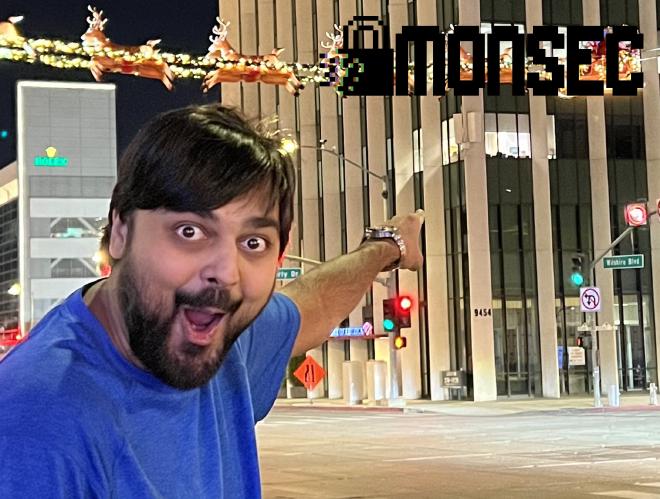
Bornstein O. & Fadiansyah A. (2022). Kali Linux Set-up. Monash Cyber Security Club. https://monsec.io/posts/resources/kali/ ↩︎
Bornstein O. (2023, February 19). 2023 Semester 1. Monash Cyber Security Club. https://monsec.io/posts/2023s1/ ↩︎
Bornstein O. (2023, July 19). 2023 Semester 2. Monash Cyber Security Club. https://monsec.io/posts/2023s2/ ↩︎